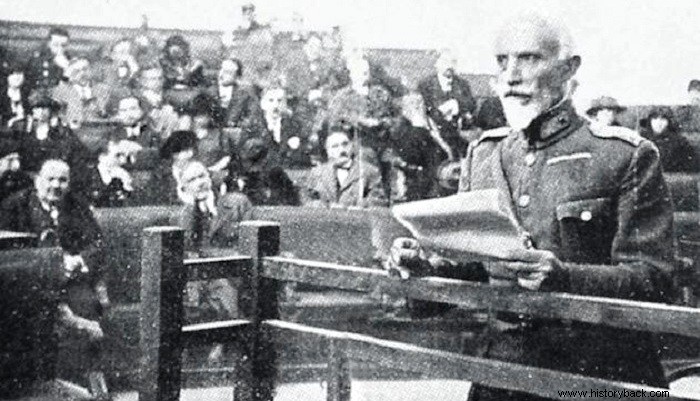
The trial of the Six is one of the most controversial events in recent Greek history. The outcome was believed to be largely decided. In that much-celebrated trial there were many events worthy of mention. However, the conflict between the two generals, Anastasios Papoulas and Georgios Hatzanestis.
Papoulas was a fanatic of the faction of King Constantine during the period of the National Schism. He had played an important role in the "Noembriana" in 1916 and had been defeated by the "Venizelics" in 1917. He remained in prison for three years until he was released on November 1, 1920 and was sent commander-in-chief of the Army of Asia Minor.
He remained in charge until March 1922 when he was replaced by another follower of Constantinos Hadzanestis. Papoulas was also on the list of potential defendants, but instead he was a prosecution witness.
"Until the day I left, in my opinion, the morale of the army was good" , General Othonaios reported to the president of the military court. He also testified that the attack on Ankara was not militarily necessary and that it failed because the 5,000 additional men he had requested were not sent.
"In order to carry out this operation, there would be a political reason, it would have some benefit. To do an operation and destroy 100,000 soldiers to destroy a railway line I don't know how to explain it" , testified Papoulas, who, however, was the one who carried out the operation in question. If he didn't agree with a business that was imposed on him, why didn't he resign?
Continuing, he attacked Hatzianestis because he commanded from Smyrna, 600 km away from the front and testified that if the latter had gone as far as Usak he would have prevented the disaster. He also accused him of having years of administration and no experience.
Hatzanestis however reacted and asked if Papoulas himself got administrative time from the prison where he had been for three years. "You think that when someone is in prison they have more experience than when they are in Switzerland" , he asked (Hatzanestis was in Switzerland at the same time).
Enraged, Papoulas replied:"I served 45 years in the army and was in so many battles and you did not serve in battles that time." whom I served so that you may have the experience that I have." Papoulas went on to blame Hadzanesti for various episodes of his military career.
Hatzanestis then asked him if the defeat was a product of his own administration or that of Papoulos. "Yours, because during my (administration) operations were carried out that loaded the army with honor and glory," answered Papoulas. Hadzanestis then asked him how long he had been commander in Asia Minor.
"Almost 20 months", was the answer. "How old was I?", Hatzanestis asked again. "About half past two," answered Papoulas. “Do you therefore ascribe the coming disaster to the corrupting causes of these two and a half months? Do you attribute this great disaster to the two and a half months?", Hadzanestis asked.
"Indeed, I attribute it to the dissolution of the complex and the withdrawal of forces," answered Papoulas, meaning the withdrawal of forces from Asia Minor to reinforce the Thracian Army which was decided as a means of putting pressure on the Anglo-French.
From the result it can be said that both Papoulas and Hadzanestis did not distinguish themselves as commanders in Asia Minor. Yet the Greek front was so extended, its flanks literally in the air, that the Turks could strike at will. The Turks also excelled in speed, having a large force of cavalry and lighter infantry formations.
The Greek troops lined up in an overextended front, with huge gaps that could not be covered even by artillery fire, simply did not have the necessary strategic flexibility to hold out. Militarily, the only solution was the reduction of the front.
As is known, Hatzanestis was sentenced to death. The morning before the execution, he contented himself with hugging and kissing his wife and daughter for the last time, without saying anything. During his transfer from the cell to the car that would take him to the place of execution, he gave a military salute to those present. When he found himself facing the detachment, he refused to be blindfolded like the other five.
Shortly before the order was given he called the revolutionary commissar colonel Neokosmos Grigoriadis and gave him his wedding ring with the order to give it to his daughter. The attending priest read the funeral liturgy. The mortals made their cross. Hadzanestis shouted:"My only shame is that I was the commander-in-chief of fugitives." A little later the rifles thundered.
For the sake of history, it is worth mentioning that Anastasios Papoulas was executed in 1935 for his participation in the Venizelian movement.
